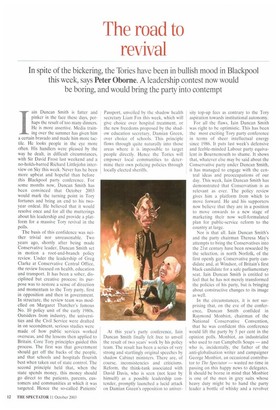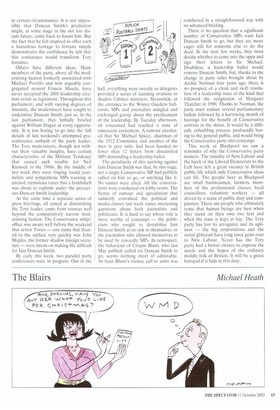The road to revival
In spite of the bickering, the Tories have been in bullish mood in Blackpool this week, says Peter Oborne. A leadership contest now would be boring, and would bring the party into contempt –1^ am n Duncan Smith is fatter and pinker in the face these days, perhaps the result of too many dinners. He is more assertive. Media training over the summer has given him a certain bravado and made him more tac
tile. He looks people in the eye more often. His handlers were pleased by the
way he dealt, in difficult circumstances, with Sir David Frost last weekend and a no-holds-barred Richard Littlejohn interview on Sky this week. Never has he been more upbeat and hopeful than before this Blackpool party conference. For some months now, Duncan Smith has been convinced that October 2003 would mark the turning point in Tory fortunes and bring an end to his twoyear ordeal. He believed that it would resolve once and for all the mutterings about his leadership and provide a platform for a massive Tory revival in the polls.
The basis of this confidence was neither trivial nor unreasonable. Two years ago, shortly after being made Conservative leader, Duncan Smith set in motion a root-and-branch policy review. Under the leadership of Greg Clarke at Conservative Central Office. the review focused on health, education and transport. It has been a sober, disciplined but creative process; its purpose was to restore a sense of direction and momentum to the Tory party, first in opposition and then in government. In structure, the review team was modelled on Margaret Thatcher's famous No. 10 policy unit of the early 1980s. Outsiders from industry, the universities and the Civil Service were drafted in on secondment, serious studies were made of how public services worked overseas, and the lessons then applied to Britain. Core Tory principles guided this process. The first was that government should get off the backs of the people, and that schools and hospitals flourish best when taken out of state control. The second principle held that, when the state spends money, this money should go direct to the patients, parents, customers and communities at which it was targeted. Hence the so-called Patients' Passport, unveiled by the shadow health secretary Liam Fox this week, which will give choice over hospital treatment, or the new freedoms proposed by the shadow education secretary, Damian Green, over choice of schools. This principle flows through quite naturally into those areas where it is impossible to target people directly. Hence the Tories will empower local communities to determine their own policing policies through locally elected sheriffs.
At this year's party conference, lain Duncan Smith finally felt free to unveil the result of two years' work by his policy team. The result has been a series of very strong and startlingly original speeches by shadow Cabinet ministers. There are, of course, inconsistencies and criticisms. Reform, the think-tank associated with David Davis, who is seen (not least by himself) as a possible leadership contender, promptly launched a lucid attack on Damian Green's opposition to univer
sity top-up fees as contrary to the Tory aspiration towards institutional autonomy. For all the flaws, lain Duncan Smith was right to be optimistic. This has been the most exciting Tory party conference in terms of sheer intellectual energy since 1986. It puts last week's defensive and feeble-minded Labour party equiva lent in Bournemouth to shame. It shows that, whatever else may be said about the Conservative party under Duncan Smith, it has managed to engage with the central ideas and preoccupations of our day. This week, lain Duncan Smith has demonstrated that Conservatism is as relevant as ever. The policy review gives him a platform from which to move forward. He and his supporters now believe that they are in a position to move onwards to a new stage of marketing their now well-formulated plan for public-service reform to the country at large.
Nor is that all. lain Duncan Smith's and the party chairman Theresa May's attempts to bring the Conservatives into the 21st century have been rewarded by the selection, in north Norfolk, of the first openly gay Conservative party candidate and, at Windsor, of Britain's first black candidate for a safe parliamentary seat. lain Duncan Smith is entitled to feel that he has not merely transformed the policies of his party, but is bringing about constructive changes to its image as well.
In the circumstances, it is not sur prising that, on the eve of the confer ence, Duncan Smith confided in Raymond Monbiot, chairman of the National Conservative Convention,
that he was confident this conference would lift the party by 5 per cent in the opinion polls. Monbiot, an industrialist who used to run Campbells Soups — and who is, incidentally, the father of the anti-globalisation writer and campaigner George Monbiot, an occasional contributor to The Spectator — wasted no time in passing on this happy news to delegates. It should be borne in mind that Monbiot is one of the men in grey suits whose heavy duty might be to hand the party leader a bottle of whisky and a revolver
in certain circumstances. It is not impossible that Duncan Smith's prediction might, at some stage in the not too distant future, come back to haunt him. But the fact that he felt inspired to offer such a hazardous hostage to fortune simply demonstrates the confidence he felt that this conference would transform Tory fortunes.
Others have different ideas. Many members of the party, above all the modernising faction formerly associated with Michael Portillo and now arguably congregated around Francis Maude, have never accepted the 2001 leadership election result as legitimate. Throughout this parliament, and with varying degrees of intensity, the modernisers have sought to undermine Duncan Smith, just as, in the last parliament, they lethally briefed against William Hague at every opportunity. It is too boring to go into the full details of last weekend's attempted preconference ambush of the party leader. The Tory modernisers, though not without their valuable insights, have certain characteristics of the Militant Tendency that caused such trouble for Neil Kinnock in the 1980s. By the middle of last week they were ringing round journalists and sympathetic MPs warning in excited, tremulous tones that a bombshell was about to explode under the precarious Duncan Smith leadership.
At the same time a separate series of press briefings, all aimed at diminishing the Tory leader, came from sources well beyond the comparatively narrow modernising faction. The Conservative whips' office was aware well before the weekend that senior Tories — one name that floated to the surface very quickly was John Maples, the former shadow foreign secretary — were intent on making life difficult for lain Duncan Smith.
By early this week, two parallel party conferences were in progress. Out in the hall, everything went sweetly as delegates provided a series of standing ovations to shadow Cabinet ministers, Meanwhile, at the entrance to the Winter Gardens ballroom, MPs and journalists mingled and exchanged gossip about the predicament of the leadership. By Tuesday afternoon, all concerned had reached a state of tumescent excitement. A rumour circulated that Sir Michael Spicer, chairman of the 1922 Committee and another of the men in grey suits, had been handed no fewer than 12 letters from dissatisfied MPs demanding a leadership ballot.
The peculiarity of this uprising against fain Duncan Smith was that, by this stage, not a single Conservative MP had publicly called on him to go, or anything like it. No names were cited. All the conversations were conducted on lobby terms. The frenzy of rumour and speculation that suddenly convulsed the political and media classes last week raises interesting questions about both journalists and politicians. It is hard to say whose role is more worthy of contempt — the politicians who sought to destabilise lain Duncan Smith at no risk to themselves, or the journalists who allowed themselves to be used by cowardly MPs. In retrospect, the behaviour of Crispin Blunt, who last May publicly called on Duncan Smith to go, seems nothing short of admirable. At least Blunt's clumsy call to arms was conducted in a straightforward way with no advanced briefing.
There is no question that a significant number of Conservative MPs want lain Duncan Smith to go, but they are more eager still for someone else to do the deed. In the next few weeks, they must decide whether to come into the open and sign their letters to •Sir Michael. Doubtless, a leadership ballot would remove Duncan Smith, but, thanks to the change in party rules brought about by Archie Norman four years ago, there is no prospect of a clean and swift resolution of a leadership issue of the kind that followed the resignation of Margaret Thatcher in 1990, Thanks to Norman, the party must endure several parliamentary ballots followed by a harrowing month of hustings for the benefit of Conservative activists in the shires. It would be a difficult, enfeebling process, profoundly boring to the general public, and would bring the Conservative party into contempt.
This week at Blackpool we saw a reminder of why the Conservative party matters. The timidity of New Labour and the lurch of the Liberal Democrats to the Left have left a great vacancy in British public life which only Conservative ideas can fill. The people here at Blackpool are small businessmen, farmers, members of the professional classes, local councillors, voluntary workers — all driven by a sense of public duty and compassion. These are people who ultimately sense that human beings are best when they stand on their own two feet and when the state is kept at bay. The Tory party has lost its arrogance and its ugliness — the big corporations and the social glitterati have long since gone over to New Labour. Never has the Tory party had a better chance to express the needs and the hopes of the ordinary middle folk of Britain. It will be a grave betrayal if it fails in this duty.



















































































 Previous page
Previous page